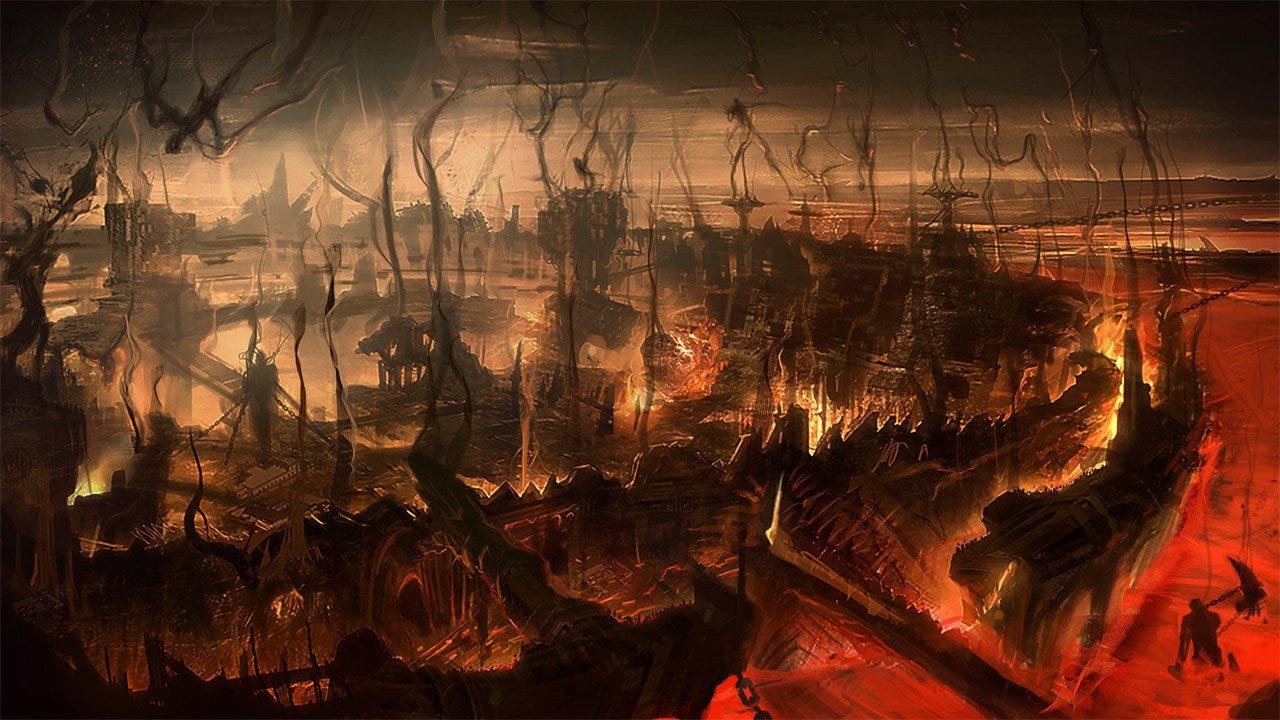
Hell is one of the most talked-about topics in the Bible, yet it remains mysterious and controversial. For many, the thought of hell sparks feelings of fear, uncertainty, or even curiosity.
But according to Christian teachings, hell isn’t just a vague concept—it’s a real place with significant spiritual meaning.
While many people prefer to focus on the promise of heaven, understanding what the Bible says about hell is equally important.
The Bible offers clear teachings on hell, emphasizing it as a consequence for those who reject God’s offer of salvation.
In this article, we will explore 14 lessons the Bible reveals about hell. By breaking down these teachings into simple, understandable points, we aim to give readers a clear view of what the Bible says about this difficult but crucial subject.
Whether you’re new to these ideas or seeking a deeper understanding, these lessons will offer insight into one of the Bible’s most serious topics.
1. Hell is Real
The Bible makes it clear that hell is a real place, not just a metaphor or an abstract concept. According to Scripture, hell is a destination for those who reject God’s grace and choose a life apart from His salvation.
In Matthew 25:46, it says, “Then they will go away to eternal punishment, but the righteous to eternal life.”
The “Comet of the Century” Is About to Light Up the Sky After 80,000 Years
This verse teaches that hell is just as real as heaven and serves as a reminder of the serious consequences of our choices.
For those who dismiss the existence of hell, the Bible‘s message stands as a warning. It’s not meant to scare but to make people aware of the importance of salvation.
Recognizing hell as a reality can help people focus on making choices aligned with God’s will, knowing that rejecting His love leads to eternal separation.
2. Hell is Described as Fire
In several parts of the Bible, hell is described with fiery imagery to convey the intensity of suffering there. For instance, Mark 9:43 says, “If your hand causes you to stumble, cut it off.
You should enter life maimed than with two hands to go into hell, where the fire never goes out.” This vivid description helps people understand that hell is a place of extreme and unending pain.
The fire symbolizes not just physical pain but also spiritual suffering. The Bible uses this imagery to make clear that rejecting God’s love has severe, eternal consequences. It’s a strong message to take salvation seriously and turn toward God.
3. Hell is Eternal
One of the most challenging aspects of hell is its eternal nature. According to Matthew 25:46, hell is a place of punishment that lasts forever.
The Bible doesn’t describe hell as a temporary state; rather, it is an eternal separation from God, where suffering never ends.
This teaching emphasizes the long-lasting impact of the choices people make in their earthly lives.
The concept of eternity in hell is meant to show how serious rejecting God is. Unlike other punishments that may eventually come to an end, the torment of hell continues without relief. It’s a reminder of the unchangeable consequences of choosing to live without God.
4. Hell is for the Wicked and Evil

Revelation 21:8 says, “But the cowardly, the unbelieving, the vile, the murderers, the sexually immoral, those who practice magic arts, the idolaters, and all liars—they will be consigned to the fiery lake of burning sulfur.
This is the second death.” Hell is described as a place reserved for those who live in rebellion against God.
This verse teaches that everyone is responsible for their actions and choices. Those who reject God’s commandments and live wickedly will face judgment in hell.
It highlights the importance of living a life that aligns with God’s will and teaches that moral responsibility plays a central role in determining our final destination.
5. Hell is Dark
Despite being described with fiery imagery, hell is also portrayed as a place of complete darkness.
Matthew 8:12 says, “But the subjects of the kingdom will be thrown outside, into the darkness, where there will be weeping and gnashing of teeth.” This darkness represents spiritual isolation and the absence of God’s light.
In hell, there is no comfort, no connection with others, and no presence of God. The darkness symbolizes total despair, emphasizing the loneliness and separation that come with rejecting God’s salvation. This imagery reinforces the bleakness of hell as a place without hope or redemption.
6. Hell is a Place of Weeping and Gnashing of Teeth
The Bible describes the emotional suffering in hell as one of deep regret and anguish. Matthew 13:42, says, “They will throw them into the blazing furnace, where there will be weeping and gnashing of teeth.” This paints a picture of intense sorrow and frustration.
The “weeping and gnashing of teeth” is a powerful image of regret, as those in hell fully realize the consequences of their choices.
It’s a place where there is no hope of relief, and the regret of turning away from God becomes unbearable. This adds to the overall understanding of hell as a place of emotional and spiritual torment.
7. Hell is a Place of Isolation
Luke 16:26 describes the isolation experienced in hell: “And besides all this, between us and you a great chasm has been set in place so that those who want to go from here to you cannot, nor can anyone cross over from there to us.”
Hell is depicted as a place of complete separation—from God, from loved ones, and anything good.
This isolation is one of the most profound aspects of hell’s suffering. People in hell are cut off from all comfort and connection, deepening their pain.
It shows that hell is not just about physical suffering but about being utterly alone and disconnected from everything positive.
Quantum Physics Claims Death Doesn’t Exist – Here’s What That Means
8. Hell is Not Created for Humans
According to Matthew 25:41, hell was not created for human beings: “Then he will say to those on his left, ‘Depart from me, you who are cursed, into the eternal fire prepared for the devil and his angels.’” This verse teaches that hell was meant for the devil and his followers, not for people.
However, when individuals reject God’s offer of salvation, they follow a path that leads to hell. This makes clear that going to hell is not a random punishment, but the result of a person’s choices. Hell is a place of judgment, but it is avoidable for those who turn to God.
9. Hell Is the Final Destination for Those Who Reject God

In the Bible, Hell is portrayed as the final destination for those who choose to live apart from God. Revelation 20:14-15 refers to Hell as the “lake of fire,” which is described as the second death. It’s the ultimate end for those who are not found in the Book of Life.
This isn’t just a temporary state; it’s a permanent, irreversible separation from God. The idea that Hell is the final destination emphasizes the importance of living a life that honors God. Once someone ends up in Hell, there’s no turning back, no second chances.
This teaching urges people to take their relationship with God seriously, knowing that eternity hangs in the balance.
While some may think of Hell as merely a warning or a distant possibility, the Bible describes it as a real, outcome for those who reject God’s grace. It’s a reminder that the choices we make now have lasting consequences in the next life.
10. Hell Is a Place of Divine Justice
Hell, according to the Bible, is a place where divine justice is carried out. God is a loving and merciful Father, but He is also a just and righteous Judge.
In 2 Thessalonians 1:9, it is explained that those who reject God will face “everlasting destruction” and be “shut out from the presence of the Lord.”
This justice is not random or unfair. It is a righteous response to sin and wickedness. People who live in opposition to God’s will, rejecting His offer of forgiveness, must face the consequences of their actions.
Hell, in this sense, is a demonstration of God’s justice—each person is held accountable for their choices.
It’s important to understand that Hell isn’t about cruel punishment but about ensuring that justice is served.
God’s judgment is fair, and He offers everyone a chance to avoid Hell by accepting His grace through Jesus Christ.
This lesson highlights the balance between God’s mercy and His justice, showing that while He offers salvation, He also ensures that wrongdoers face consequences if they refuse His gift.
11. Hell Is a Warning of What’s to Come
One of the most critical aspects of Hell is that it serves as a warning in the Bible. God doesn’t want anyone to end up in Hell, so He gives us clear instructions and warnings throughout the Scriptures.
In Matthew 5:22, Jesus speaks about the danger of the fire of Hell, urging people to live righteously and avoid the things that lead to destruction.
This warning is meant to wake people up and encourage them to turn to God before it’s too late. It serves as a reminder of the consequences of living apart from God.
Hell isn’t something to take lightly—it’s a reality that God uses to motivate us to seek salvation and live in alignment with His will.
The warning about Hell is not meant to scare but to guide us. It’s a way for God to show us the serious nature of our choices and the need to repent.
By understanding this, we can appreciate the urgency of turning to God and seeking His forgiveness before it’s too late. Hell, in this sense, is a reminder of what’s at stake in our spiritual lives.
12. Hell Is a Place of Conscious Suffering
The Bible describes Hell as a place where people experience conscious suffering. In Luke 16:23-24, a man who is in Hell calls out in torment, asking for just a drop of water to ease his pain.
This passage makes it clear that the suffering in Hell is not abstract or unconscious. It’s very real, and those in Hell are fully aware of their pain and isolation from God.
This consciousness adds to the torment because people in Hell understand what they’ve lost. They know that they are separated from God and all the goodness that comes from His presence. The realization of this eternal separation makes the suffering even more intense.
This lesson from the Bible shows us that Hell is not just a place of physical suffering but also emotional and spiritual anguish.
It highlights the gravity of being separated from God and serves as a warning to those who think lightly of rejecting His grace.
It reminds us to take our spiritual choices seriously, knowing that Hell is not just about punishment but about experiencing the full weight of a life lived without God.
13. Hell Can Be Avoided
Perhaps the most important lesson the Bible teaches about Hell is that it can be avoided. In John 3:16, the Bible tells us that “whoever believes in [Jesus] shall not perish but have eternal life.”
This means that no matter our past mistakes, we can choose to accept God’s offer of salvation and be spared from the consequences of Hell.
God doesn’t want anyone to go to Hell. He offers a way out through faith in Jesus Christ. By accepting Jesus as our Savior and turning away from sin, we can avoid eternal separation from God and receive the gift of eternal life.
Hell is not inevitable for anyone—it’s a choice based on whether or not we accept God’s grace.
This teaching brings hope. It shows that no matter how far we may feel from God, there’s always a path back to Him.
The message is clear: Hell can be avoided through faith, repentance, and a life lived in alignment with God’s will.
This is the ultimate message of the Bible’s teachings on Hell: that we have the power to choose eternal life instead of eternal separation.
Woman Heads for an Oil Change, Leaves with a $1K Bill for ‘Melting’ Brakes
14. Hell Is Total Separation from God
The Bible describes Hell as a place of total separation from God. In 2 Thessalonians 1:9, it says that those in Hell are “shut out from the presence of the Lord.” This means that Hell is a place where there is no trace of God’s love, grace, or goodness.
Without God, everything that is good, comforting, and joyful is absent. This is what makes Hell so unbearable.
It’s not just about physical torment but the agony of being completely cut off from the One who is the source of all life and goodness. This separation is what makes Hell such a terrible place.
This lesson teaches us that the worst part of Hell is not the fire or the darkness but being separated from God forever.
It’s a reminder of the importance of maintaining a relationship with God and choosing to live in His light. Hell is a place where God’s presence is nowhere to be found, and that’s what makes it a place of profound suffering.
By choosing to accept God’s grace, we can avoid this separation and experience eternal life in His presence.
